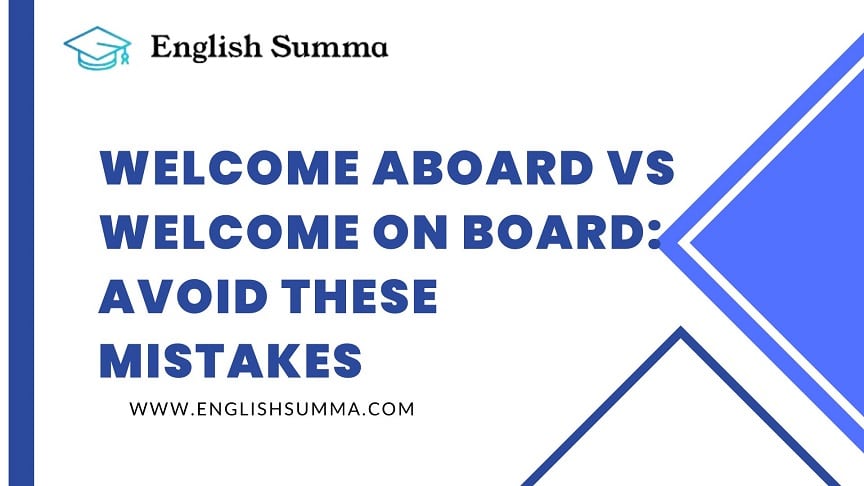In the vast ocean of the English language, certain phrases can often cause confusion, even among native speakers. Two such expressions are “welcome aboard” vs “welcome on board.” While they may seem interchangeable at first glance, they carry distinct meanings and usages. In this article, we’ll dive deep into the nuances of these phrases, exploring their definitions, contexts, and proper applications.
Welcome Aboard vs Welcome On Board: Navigating the Difference
Let’s get started and learn the difference.
Welcome Aboard: A Warm Embrace
The phrase “welcome aboard” is typically used to greet someone who is joining a team, organization, or group. It conveys a sense of inclusion and camaraderie, as if the newcomer is boarding a metaphorical ship or vessel. This expression is commonly used in social and interpersonal contexts, such as:
- Welcoming a new employee to a company: “Welcome aboard, Sarah! We’re excited to have you on our team.”
- Greeting a new member of a club or organization: “Welcome aboard, John! We’re glad you’ve joined our group.”
- Welcoming someone to a project or endeavor: “Welcome aboard, everyone! Let’s embark on this exciting journey together.”
In these scenarios, “welcome aboard” serves as a friendly and inclusive phrase, making the newcomer feel like they are part of a collective effort or team.
Is it Acception Or Exception? Avoid These Mistakes
Welcome On Board: A Professional Invitation
On the other hand, “welcome on board” is often used in more formal or professional contexts, particularly in the business world. It implies inviting someone to participate in a specific project, venture, or endeavor. This phrase is commonly used in commercial, marketing, and promotional settings, such as:
- Inviting a client or partner to collaborate on a business deal: “We’d like to welcome you on board for this exciting new project.”
- Announcing a new product or service: “Welcome on board our latest innovation, designed to revolutionize the industry.”
- Recruiting new talent: “We’re thrilled to welcome you on board as our new marketing director.”
In these instances, “welcome on board” carries a more official and ceremonial tone, signaling the start of a professional relationship or endeavor.
| Phrase | Context | Example |
|---|---|---|
| Welcome aboard | Greeting new employees, students, or team members | “Welcome aboard, John! We’re excited to have you join our marketing department.” |
| Welcome on board | Acknowledging acceptance, confirming membership, or welcoming back returning members | “Congratulations on accepting the position, Sarah. Welcome on board!” |
Scenario Examples: Putting the Phrases into Context
To better understand the distinction between these two phrases, let’s explore some hypothetical scenarios:
- Joining a Sports Team: If you’ve just been selected to play for a local soccer club, the coach might say, “Welcome aboard, Sarah! We’re excited to have you on our crew.”
- Starting a New Job: During your first day at a new company, your manager might greet you with, “Welcome aboard, John! We’re thrilled to have you join our team.”
- Launching a New Product: In a promotional video for a new smartphone, the narrator might say, “Welcome on board our latest innovation, designed to revolutionize the way you communicate.”
- Partnering with a Client: When finalizing a business deal, a company representative might state, “We’re pleased to welcome you on board for this exciting venture.”
Learn the correct form of Is There Any Vs Are There Any
Synonyms and Related Expressions
To further illustrate the nuances between these phrases, let’s explore some synonyms and related expressions:
Welcome aboard synonyms:
- “We’re glad you’re joining the team“
- “Welcome to the club“
- “Welcome to our team“
Welcome on board synonyms:
- “We invite you to participate”
- “We’re pleased to have you on board“
- “Welcome to the club (in a professional context)”
Embracing the Subtleties
While “welcome aboard” and “welcome on board” may seem similar at first glance, they carry distinct connotations and usages. Therefore, understanding the nuances between these phrases, idioms, and expressions is crucial for effective communication in both social and professional contexts.
Whether you’re welcoming a new colleague, inviting a client to collaborate, or embracing a newcomer into your group, choosing the right phrase can make a significant difference in conveying the intended meaning and tone.
By mastering the subtleties of these expressions, you’ll not only enhance your command of the English language but also demonstrate a level of professionalism and cultural awareness that will undoubtedly leave a lasting impression.
Is it What Kind of or What Kinds of? Learn more in this post.
Learn which form is correct, Of Course or Ofcourse

